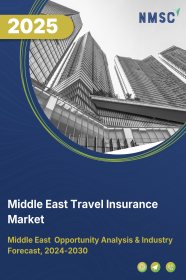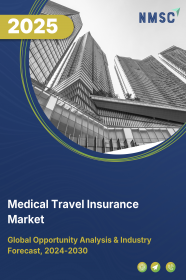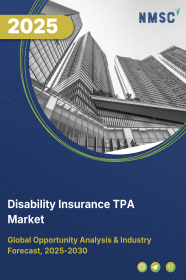
Middle East Travel Insurance Market by Age (Millennials, Generation X, and Baby Boomers), by Income Level (Low-income travelers, Middle-income travelers and High-Income Travelers), by Coverage (Medical Coverage, Trip Cancellation Coverage, Baggage and Personal Belongings Coverage, Accidental Death and Dismemberment (AD&D) Coverage) – Global Opportunity Analysis and Industry Forecast, 2024–2030
Industry: BFSI | Publish Date: 21-Feb-2025 | No of Pages: 123 | No. of Tables: 90 | No. of Figures: 55 | Format: PDF | Report Code : BF1997
Market Overview
The Middle East Travel Insurance Market size was valued at USD 225.4 million in 2023 and is predicted to reach USD 573.0 million by 2030, with a CAGR of 13.0 % from 2024 to 2030. Travel insurance serves as a specialized form of insurance aimed at providing protection and coverage to travelers against a wide array of potential risks and unforeseen circumstances that may arise before or during their journeys. It plays a vital role in mitigating the financial impact of various travel-related emergencies, disruptions, and inconveniences, thereby offering travelers a sense of security and peace of mind throughout their trips. One of its key benefits lies in its ability to offer financial reimbursement and assistance in the event of trip cancellations or interruptions. This coverage encompasses unforeseen situations such as illness, injury, or emergencies, enabling travelers to recover non-refundable expenses associated with flights, accommodations, and other pre-paid arrangements.
Rising Number of Outbound Travelers Boost the Middle East Market Growth
The rising number of outbound travelers has emerged as a key catalyst for market expansion across various sectors of the travel industry in the country. With an increasing number of individuals embarking on journeys abroad for leisure, business, or other purposes, there is a corresponding surge in demand for associated services such as accommodation, transportation, and notably, travel insurance. This trend has notably propelled the market growth of travel insurance, as travelers become increasingly aware of the necessity for financial protection against unforeseen events such as medical emergencies, trip cancellations, or lost luggage while traveling overseas. Consequently, insurance providers are witnessing a larger customer base, prompting them to offer expanded services, competitive pricing, and innovative solutions tailored to meet the diverse needs of outbound travelers, thereby driving further market growth.
The Growing Number of Online Platforms for Travel Insurance Drives the Middle East Industry
The expansion of online platforms dedicated to travel insurance has had a profound effect on the travel insurance sector in the country, significantly improving accessibility and convenience for consumers. These platforms present a plethora of choices, enabling travelers to effortlessly compare policies and choose the one that aligns best with their requirements and financial constraints. Moreover, the online availability of these platforms streamlines the purchasing process, allowing for swift and efficient transactions without the hassle of extensive paperwork or visits to physical insurance offices. Consequently, the proliferation of online platforms has spurred competition within the industry, compelling insurance companies to innovate and offer more competitive rates and comprehensive coverage options to entice customers in the increasingly digital landscape.
Regulatory Challenges Hinder the Middle East Market Growth
Navigating regulatory challenges presents formidable obstacles to the expansion of the travel insurance market in the country. Adhering to diverse regulations across various regions and nations proves intricate and financially burdensome for insurance providers. Furthermore, regulatory shifts or ambiguities may erect barriers to market entry for newcomers, constraining both competition and innovation. Additionally, rigorous regulations concerning coverage terms, pricing structures, and claims handling can restrict insurers' capacity to provide adaptable and personalized products that cater to evolving consumer demands. These obstacles not only elevate administrative complexities but also curtail prospects for market enlargement, impeding the overarching growth trajectory of the travel insurance sector.
Integration of Blockchain Technology Creates Ample Opportunity for the Middle East Market Growth
The incorporation of blockchain technology offers abundant opportunities for market expansion within the travel insurance sector in the country. Blockchain provides heightened security, transparency, and efficiency in data management and transactions, thereby diminishing fraudulent activities and enhancing trust between insurers and customers. Smart contracts, made possible by blockchain, can automate policy issuance, claims processing, and settlements, streamlining operations and cutting administrative costs for insurers. Furthermore, blockchain's decentralized nature facilitates seamless collaboration among stakeholders, including insurers, travel agencies, and healthcare providers, facilitating quicker and more precise information exchange. This integration not only enriches customer experiences by offering real-time updates and personalized services but also unlocks new pathways for innovative insurance products, such as parametric insurance, tailored to specific travel risks. Ultimately, blockchain technology establishes a robust foundation for market expansion by promoting operational efficiencies, cost reductions, and fostering increased trust and cooperation across the travel insurance landscape.
Competitive Landscape
Several market players operating in the Middle East travel insurance market include Allianz Group, AXA SA, Zurich Insurance Group Limited, American International Group, Inc., Chubb Limited, Aviva PLC, Nationwide, Berkshire Hathaway Speciality Insurance, Travel Insured International, Generali Group and Others.
Middle East Travel Insurance Market Key Segments
By Age
-
Millennials
-
Generation X
-
Baby Boomers
By Income Level
-
Low-income Travelers
-
Middle-income Travelers
-
High-income Travelers
By Coverage
-
Medical Coverage
-
Trip Cancellation Coverage
-
Baggage and Personal Belongings Coverage
-
Accidental Death and Dismemberment (AD&D) Coverage
By Days of Coverage
-
Short-Trip Insurance
-
Standard Trip Insurance
-
Extended Trip Insurance
-
Multi-Trip Insurance
By End User
-
Pilgrim Travelers
-
Education Travelers
-
Business Travelers
-
Family Travelers
By Distributional Channel
-
Insurance Companies
-
Banks
-
Airlines
-
Online Platforms
-
Insurance Aggregators and Comparison Websites
-
Travel Agents and Tour Operators
REPORT SCOPE AND SEGMENTATION:
|
Parameters |
Details |
|
Market Size in 2023 |
USD 225.4 Million |
|
Revenue Forecast in 2030 |
USD 573.0 Million |
|
Growth Rate |
CAGR of 13.0 % from 2024 to 2030 |
|
Analysis Period |
2023–2030 |
|
Base Year Considered |
2023 |
|
Forecast Period |
2024–2030 |
|
Market Size Estimation |
Million (USD) |
|
Growth Factors |
|
|
Companies Profiled |
10 |
|
Market Share |
Available for 10 companies |
|
Customization Scope |
Free customization (equivalent up to 80 working hours of analysts) after purchase. Addition or alteration to country, regional, and segment scope. |
|
Pricing and Purchase Options |
Avail customized purchase options to meet your exact research needs. |
KEY PLAYERS
-
Allianz Group
-
AXA SA
-
Zurich Insurance Group Limited
-
American International Group, Inc.
-
Chubb Limited
-
Aviva PLC
-
Nationwide
-
Berkshire Hathaway Speciality Insurance
-
Travel Insured International
-
Generali Group

















 Speak to Our Analyst
Speak to Our Analyst





















